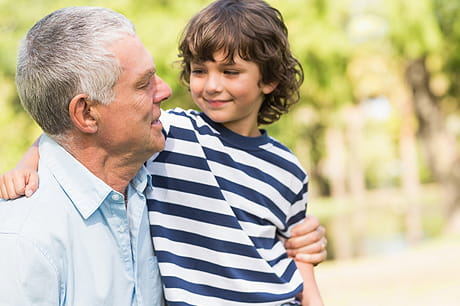What to say when grandpa is sick
Every parent’s natural reaction is to shield their children from pain and suffering. However, when a grandparent or elderly loved one is sick, experts say telling the truth is better than trying to hide it. Even young children know when something isn’t right, so your honesty during this difficult time can help build trust and help them cope better with challenges later in life.
“Sickness and death are a natural part of life. In previous generations and other cultures, children experienced these stages of life firsthand,” said Joyce Morano, M.D., a geriatrician, and hospice and palliative medicine specialist at LIFE Geisinger in Scranton. “Grandparents lived and were cared for under the same roof. Now that process is different since many older adults live in long-term care facilities and receive treatment in hospitals.”
The following advice will help you deal appropriately with this difficult time.
Practice what to say
When a family member is sick, everyone’s emotions are heightened. It’s important to practice what you plan to say to your children before starting the conversation. They will follow your lead and react based on your emotional state. If you anticipate that you will not be able to control your emotions, it may be better to have another family member help with the conversation.
Use age-appropriate explanations
When describing the illness and what’s going to happen, use terminology your children can understand. Saying “grandpa has a problem with his heart and the doctors are trying to help him,” will be better than trying to describe the intricacies of coronary heart disease to an eight-year-old.
Keep it brief and elaborate if needed
Start with the simplest explanation and expand on it when your children ask questions. This gives them the ability to request as much information as they can handle without feeling overwhelmed.
Be realistic in your reassurances
“If your sick loved one has a terminal illness, do not offer false hope,” said Dr. Morano. “As difficult as it may be, be clear with your children that your loved one may die. Talking about death early can help them prepare.”
Tolerate changes in behavior
When a close relative is ill, children do not always verbalize their emotions about the situation the same way adults do. They may act out, whine or cling to you more than usual. This is their way of communicating how they feel about it.
Expect to repeat yourself
Your children may have new questions after they think about your initial conversation. They may also need to have the same discussion over again for reassurance. Be patient and be prepared to talk about the illness multiple times.
Decide if visiting will help or harm
In some cases, visiting a sick grandparent may help your children accept the loved one’s illness. However, if the illness is particularly devastating, it may do more harm than good. If you decide to visit, make sure you prepare your children for any changes in appearance or medical equipment they may encounter.
Find ways for them to help
You will likely be busier than usual caring for a sick loved one. Finding ways for your children to get involved, such as helping to cook a meal or push a wheelchair, will make them feel less isolated and alone during this difficult time.
“If your children have trouble dealing with a grandparent’s illness or death, talk to their pediatrician or your loved one’s hospice and palliative care physician,” said Dr. Morano. “These doctors can suggest a counselor or other resources to help your children cope with any questions or confusion.”

